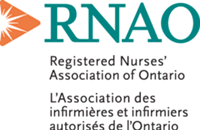Nurses applaud multi-phased approach to improving home and community care in Ontario
TORONTO, May 13, 2015 /CNW/ - The Ontario government's plan to implement much-needed changes to home and community care is an excellent first step toward providing more effective and efficient health services to the public, says the Registered Nurses' Association of Ontario (RNAO).
The professional association representing the province's registered nurses, nurse practitioners, and nursing students applauds today's Ministry of Health and Long-Term Care announcement that it will act on recommendations from the March 2015 report from the Expert Panel on Home and Community Care, chaired by nurse leader Gail Donner.
This morning, health minister Dr. Eric Hoskins announced Ontario will begin a multi-phased approach – informed by expert stakeholders such as RNAO – to improve the home and community care sector. This new approach includes increasing funding, supporting family-centred care, improving supports for caregivers, and expanding the maximum number of nursing visits, based on client need.
"RNAO is encouraged by this strong first step to provide faster and more consistent access to high quality, publicly-funded home and community care services," says RNAO President Vanessa Burkoski. "We look forward to working with Minister Hoskins to ensure Ontario is providing the best care to its people."
For years, RNAO has advocated for a staged approach to improving home and community care in Ontario. The Enhancing Community Care for Ontarians (ECCO) report, first introduced by RNAO in 2012, outlines changes to make the delivery of home and community care more timely and responsive to the needs of people and families, and more efficient and cost-effective for the health system.
"We are pleased to see that many aspects of the government's plan are consistent with RNAO's visionary ECCO report, which includes significant changes to optimize home and community care," says Doris Grinspun, CEO of RNAO. "We encourage the government to stay on this path, and proceed with the necessary structural changes, including anchoring the system in primary care and placing more emphasis on health promotion and disease prevention. This will include leveraging poverty reduction strategies and health services."
In the ECCO model, care co-ordinators from Community Care Access Centres (CCAC) would be transitioned into primary care, with their compensation and benefits fully intact, to help co-ordinate the care of people with complex conditions as they navigate the system. The model also recommends streamlining care delivery by expanding the mandate of the Local Health Integration Networks (LHIN) to include all sectors and eliminating the CCACs as expensive structural duplication.
"Ontario is headed in the right direction," Grinspun added. "Let's continue to be bold – the health of Ontarians depends on it.'
This year marks the Registered Nurses' Association of Ontario's (RNAO) 90th anniversary. RNAO is the professional association representing registered nurses, nurse practitioners, and nursing students in Ontario. Since 1925, RNAO has advocated for healthy public policy, promoted excellence in nursing practice, increased nurses' contribution to shaping the health-care system, and influenced decisions that affect nurses and the public they serve. For more information about RNAO, visit RNAO.ca or follow us on Facebook and Twitter.
SOURCE Registered Nurses' Association of Ontario

For more information, or to arrange an interview with a nurse, please contact: Daniel Punch, Communications Officer/Writer, Registered Nurses' Association of Ontario (RNAO), 416-408-5606 (office)

Share this article